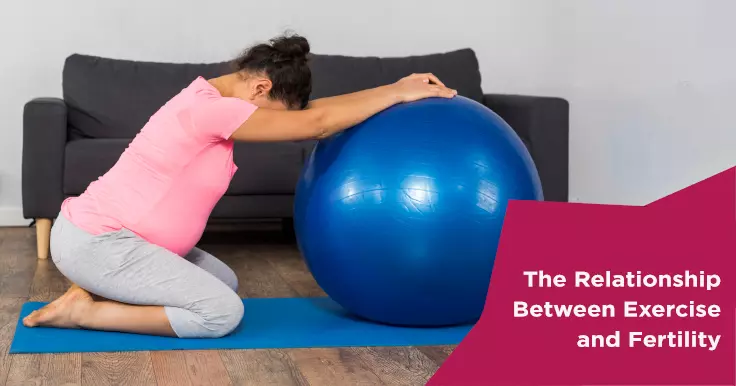The Relationship Between Exercise and Fertility: What You Should Know

It has been long known that physical activity is beneficial for overall health and well-being. Exercise helps in maintaining a healthy weight, improves cardiovascular health and overall improves how one feels. However, in the realm of female fertility, vigorous exercise can have a profound effect more so when there is an energy deficit. Body weight and body fat composition have a bearing on female fertility. Research has shown that a BMI (body mass index) of 20 - 24.9 is to be maintained for optimal fertility and regular ovulation. A minimum of 17% body fat is required for menarche and 22% is required for maintenance of ovulation. When the levels fall below this, ovulatory disturbances and menstrual irregularities set in which cause difficulty in conception.
It has been established that it is not the stress of exercise that causes reproductive dysfunction; rather, in an attempt to conserve energy, metabolic adaptations triggered by an energy deficiency alter the normal production and pulsatility of reproductive hormones at all levels of the hypothalamic–pituitary–ovarian (HPO) axis. As such, estrogen and progesterone concentrations decline, resulting in a spectrum of exercise associated menstrual disturbances (EAMD).
Suppressed follicular growth and oocyte maturation, poor endometrial quality, spontaneous abortion, and infertility are all clinical reproductive consequences of EAMD. Exercise induced menstrual disorders contribute to about 6% of couples with infertility.
The causes of infertility with too much exercise are:
- Luteal phase defects - the post ovulatory phase is shortened.
- Low levels of progesterone in the post ovulatory phase - progesterone is required for preparation of the lining of the uterus for implantation and for support of pregnancy. When the levels are low, poor implantation may occur.
- Hormones responsible for ovulation i.e GnRH, FSH, LH and estradiol are suppressed which causes ovulatory dysfunction.
- The hormone leptin is suppressed which interferes with appetite - and the intake of healthy fat and adequate calories are affected.
The implications of exercise include:
- Aerobic exercise for seven or more hours per week may increase risk of ovulatory problems
- Vigorous exercise may decrease fertility in women with normal weight
- Moderate exercise for over an hour and less than five hours per week increases fertility in all women
- Strenuous exercise for more than four hours per week decreases IVF success rates
The recommendations for exercise when trying conceive are:
- If you are doing intense workout for more than four hours, cut back. Replace some of the workouts with moderate exercise.
- Limit strenuous activities to 4 hours / week if weight loss is required
- If overweight, losing even 10% body weight can improve fertility
Improvement in fertility and fertility benefits are seen even before normal BMI is reached
The advice is to build up to:
- At least 150 minutes of moderate aerobic activity a week, and
- Strength exercises on two or more days a week that work all the major muscles
Or
- 75 minutes of vigorous activity a week, and
- Strength exercises on two or more days a week that work all the major muscles
Or
- A mix of moderate and vigorous aerobic exercise a week
- Strength exercises on two or more days a week that work all the major muscles.
Moderate activity means any exercise that will raise your heart rate, make you breathe faster and feel warmer. You should still be able to talk without pausing for breath. Vigorous activity means any exercise that makes you breathe hard and fast. If you're working at this level, you won't be able to say more than a few words without pausing for breath.
The good news
Exercise is not the problem! Studies have looked at whether there is something intrinsically problematic about exercise itself, and the research seems to suggest that there is not. It’s really just about energy deficit. The good news here is that if you are vigilant about taking in enough calories to account for your activity levels, you should be able to maintain a healthy cycle. Exercise does not appear to cause permanent damage to fertility. Since energy deficit is the main factor in causing menstrual disturbances, recovery is noted when the energy balance is restored. If you need to gain weight, it may not be much! The amount of weight that needs to be gained to regain healthy cycles is usually not exorbitant five or ten pounds may be all that stands between you and optimal health and fertility.
Men and exercise
There is not enough evidence to show that vigorous exercise causes male infertility. It has been seen that intense exercise can cause a decrease in sperm concentration and motility. In men, being overweight can affect the quality and quantity of their sperm. It has been found that moderate intensity continuous training managed to improve sperm quality the most. If you suspect that your weight might be connected to your inability to get pregnant, talk to a fertility consultant.
 Infertility Counselling
Infertility Counselling Female Infertility Treatment
Female Infertility Treatment Andrology Treatment
Andrology Treatment Fertility Enhancing Surgeries - Female
Fertility Enhancing Surgeries - Female Fertility Enhancing Surgeries - Male
Fertility Enhancing Surgeries - Male Endoscopy Treatment
Endoscopy Treatment IUI Treatment
IUI Treatment IVF Treatment
IVF Treatment ICSI Treatment
ICSI Treatment Advanced IVF Solutions
Advanced IVF Solutions Embryology
Embryology Vitrification Egg, Embryo, Sperm Freezing
Vitrification Egg, Embryo, Sperm Freezing Preimplantation Genetic Testing (PGT)
Preimplantation Genetic Testing (PGT) Donation Program Embryo / Egg / Sperm
Donation Program Embryo / Egg / Sperm Self-cycleTM IVF
Self-cycleTM IVF

 Self-cycleTM IVF
Self-cycleTM IVF








